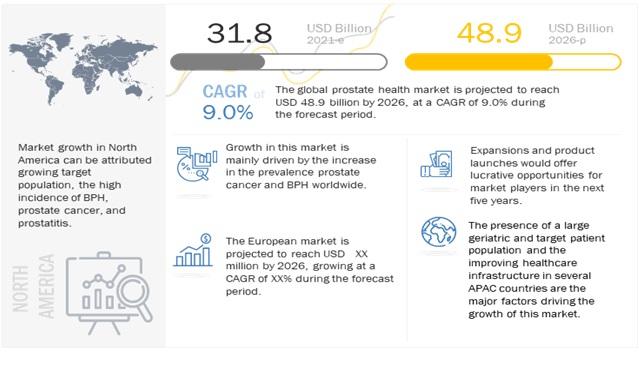The prostate gland (the prostate) is an organ of the male reproductive system. The three most common forms of prostate disease are inflammation (prostatitis), non-cancerous enlargement of the prostate (benign prostatic hyperplasia or BPH), and prostate cancer. Benign prostatic hyperplasia (BPH) is defined as a medical condition affecting men. It involves the non-cancerous enlargement of the prostate gland. While BPH rarely shows symptoms before the age of 40, the risk of contracting BPH increases with age.
The condition affects nearly 50% of men between the ages of 51 and 60 and up to 90% of men older than 80. Treatment measures such as medications and surgery have been used for patients with BPH.
Unfavorable changes in regulations and guidelines are hampering the growth of this industry. Major regulatory authorities across the globe (such as CDC, WHO, MHRA, TGA, and EMA) have identified that cancer patients are at greater risk of COVID-19 infection than healthy adults. Thus, screening, diagnostic exams, and surgical procedures are severely restricted or postponed at hospitals and cancer care centers.
Download PDF Brochure @ https://www.marketsandmarkets.com/pdfdownloadNew.asp?id=107055093
This is expected to cause disruptions in the prostate health market. Owing to the factors above, caregivers and hospitals are expected to witness delays in elective surgeries and screening procedures. However, the market has gradually risen from the second half of 2020 due to the increase in the number of oncology appointments, prostate cancer therapies among others resulting from efforts to clear backlogs and new cases and fully re-opened healthcare services.
While drugs and surgery can treat BPH, both methods are associated with significant side effects. Medicines commonly used to treat BPH include alpha blockers, 5-ARIs (5-alpha reductase inhibitors), and other drug classes. Common side effects of alpha blockers include dizziness, orthostatic hypotension, retrograde ejaculation, and rhinitis. Dizziness and orthostatic hypotension are of increased concern among the elderly as they can cause significant morbidities such as falls and subsequent injuries.
Finasteride and Dutasteride (among other 5-ARIs) convert testosterone to dihydrotestosterone. These drugs also reduce the synthesis of several neuroactive steroids, but the modulation of the neuroendocrine stress response may lead to depression. Other side effects of 5-ARIs are gynecomastia, impotence, and decreased libido and ejaculate volume.

Emerging economies (such as China, India, Brazil, and Mexico) are expected to offer significant growth opportunities to market players in the coming years. Factors such as the presence of a large target patient population, rising healthcare expenditure, growing awareness among physicians, and significant growth in the geriatric population are expected to boost the demand for prostate health methods across these countries.
The Asia Pacific is home to a large and rapidly growing patient population for benign prostatic hyperplasia. Moreover, the proportion of geriatric individuals (who are at a higher risk for these target indications) in the overall population is expected to increase sharply in the region, especially in Japan, China, South Korea, Hong Kong, and Taiwan (Source: US Census Bureau). Considering these factors, prominent and emerging product manufacturers in the prostate health market are increasingly focusing on expanding their businesses across emerging Asia Pacific countries.
Some of the prominent players operating in the prostate health market are Eli Lilly and Company (US), Pfizer Inc. (US), Merck & Co., Inc. (US), GlaxoSmithKline plc. (UK), Abbott (US), and Astellas Pharma Inc. (Japan) and other players.
